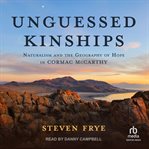Nonfiction
eAudiobook
Details
PUBLISHED
Made available through hoopla
EDITION
DESCRIPTION
1 online resource (1 audio file (7hr., 51 min.)) : digital
ISBN/ISSN
LANGUAGE
NOTES
Read by Danny Campbell
It took six novels and nearly thirty years for Cormac McCarthy to find commercial success with All the Pretty Horses, followed by major prizes, more bestsellers, and Hollywood adaptations of his work. Those successes, though, have obscured McCarthy's commitment to an older form of literary expression: naturalism. McCarthy's work tends to darker themes: violence, brutality, the cruel indifference of nature, themes which would not be out of place in the writing of Jack London or Stephen Crane. But literary naturalism is more than the oversimplified Darwinism that many think of. Nature may be red in tooth and claw, and humans are part of nature, but the humanity depicted in naturalist literature is capable of love, selflessness, and spirituality, as well. In Unguessed Kinships, Steven Frye illuminates all these dimensions of McCarthy's work. In his novels and plays, McCarthy engages both explicitly and obliquely with the project of manifest destiny, in the western drama Blood Meridian, the Tennessee Valley Authority-era Tennessee novels, and the atomic frontier of Alamogordo in Cities of the Plain. McCarthy's concerns are deeply religious and philosophical, drawing on ancient Greek philosophy, Gnosticism, and Nietzsche, among other sources. Frye argues for McCarthy not merely as a naturalist writer but as a naturalist in the most expansive sense
Mode of access: World Wide Web







